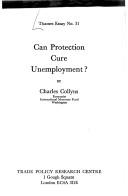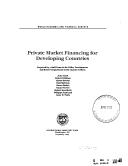| Listing 1 - 10 of 18 | << page >> |
Sort by
|

ISBN: 090084261X 9780900842610 Year: 1982 Volume: 31 Publisher: London Trade policy research centre
Abstract | Keywords | Export | Availability | Bookmark
 Loading...
Loading...Choose an application
- Reference Manager
- EndNote
- RefWorks (Direct export to RefWorks)
Labour market --- Foreign trade policy --- Foreign trade and employment --- Protectionism --- Commerce extérieur et emploi --- Protectionnisme --- 339.545 --- 331.56 --- Free trade and protection --- Commercial policy --- Employment and foreign trade --- Labor market --- Commerce --- International trade --- Labor supply --- Investments, Foreign, and employment --- Trade adjustment assistance --- Boycot. Contingentering. Handelsbelemmering. Embargo. Handelsoorlog. Protectionisme. Discriminatie. Autarchie --- Werkloosheid. Arbeidsreserve --- Effect of international trade on --- 339.545 Boycot. Contingentering. Handelsbelemmering. Embargo. Handelsoorlog. Protectionisme. Discriminatie. Autarchie --- 331.56 Werkloosheid. Arbeidsreserve --- Commerce extérieur et emploi

ISBN: 1557753180 Year: 1992 Publisher: Washington (D.C.): IMF
Abstract | Keywords | Export | Availability | Bookmark
 Loading...
Loading...Choose an application
- Reference Manager
- EndNote
- RefWorks (Direct export to RefWorks)
Loans, Foreign --- Debts, External --- Debt relief --- Debt equity conversion --- Prêts étrangers --- Dettes extérieures --- Dettes --- Conversion en prises de participation --- -Debt relief --- -Debts, External --- -Loans, Foreign --- -339.727 --- 339.96 --- 339.732 --- (100-77) --- $?$93/02 --- AA / International- internationaal --- 338.340 --- 382.256 --- 382.254 --- Foreign loans --- International loans --- Loans, International --- Loans --- Conditionality (International relations) --- Foreign loan insurance --- Debts, Foreign --- Debts, International --- External debts --- Foreign debts --- International debts --- Debt --- International finance --- Investments, Foreign --- Debt renegotiation --- Debt rescheduling --- Debt restructuring --- Relief, Debt --- Renegotiation, Debt --- Rescheduling, Debt --- Restructuring, Debt --- Debtor and creditor --- Buybacks, Debt --- Conversion, Debt-equity --- Debt buybacks --- Debt-equity swaps --- Swaps (Finance) --- Algemene ontwikkeling in de Derde Wereld. --- Buitenlandse hulp (betalingsbalans). --- Internationale kredieten. --- Law and legislation --- Prêts étrangers --- Dettes extérieures --- Algemene ontwikkeling in de Derde Wereld --- Buitenlandse hulp (betalingsbalans) --- Internationale kredieten --- -Loans, Foreign -
Book
ISBN: 145527206X 1455241547 1557750572 Year: 1983 Publisher: Washington, D.C. : International Monetary Fund,
Abstract | Keywords | Export | Availability | Bookmark
 Loading...
Loading...Choose an application
- Reference Manager
- EndNote
- RefWorks (Direct export to RefWorks)
This paper discusses the operations of a wide range of central banking institutions in developing countries. The considerable diversity of economic, financial, and political conditions within the Third World has brought forth a wide variety of central banking institutions. Four polar types have been identified as providing coherent alternatives to the central bank. Historical experience certainly indicates that legislation on its own may not be enough to guarantee prudent behavior. Although many countries' central banking institutions have not yet come close to violating foreign exchange cover requirements or restrictions on government lending, in other cases the rules have simply been sidestepped by technical adjustments, altered expediently, or merely ignored. The organizational structure established by legislation probably plays a more positive part in determining a central banking institution's characteristic behavior. Operating procedures, channels of communication, and lines of command all exert some influence on where and how decisions are made in practice. The balance of power between government and monetary authority does not only depend on personality and outside support but will also be influenced by the institutional framework in which their interaction is established.
Banks and Banking --- Exports and Imports --- Foreign Exchange --- Money and Monetary Policy --- Banks --- Depository Institutions --- Micro Finance Institutions --- Mortgages --- Monetary Systems --- Standards --- Regimes --- Government and the Monetary System --- Payment Systems --- Monetary Policy, Central Banking, and the Supply of Money and Credit: General --- Financial Aspects of Economic Integration --- Monetary Policy --- Banking --- Monetary economics --- International economics --- Currency --- Foreign exchange --- Commercial banks --- Currencies --- Monetary unions --- Credit --- Financial institutions --- Money --- Domestic credit --- Economic integration --- Banks and banking --- Foreign exchange reserves --- Singapore
Article
Abstract | Keywords | Export | Availability | Bookmark
 Loading...
Loading...Choose an application
- Reference Manager
- EndNote
- RefWorks (Direct export to RefWorks)
Book
Year: 1983 Publisher: Washington (D.C.): International monetary fund,
Abstract | Keywords | Export | Availability | Bookmark
 Loading...
Loading...Choose an application
- Reference Manager
- EndNote
- RefWorks (Direct export to RefWorks)

ISBN: 155775361X Year: 1993 Publisher: Washington (D.C.): IMF
Abstract | Keywords | Export | Availability | Bookmark
 Loading...
Loading...Choose an application
- Reference Manager
- EndNote
- RefWorks (Direct export to RefWorks)
Loans, Foreign --- -Debts, External --- -Debt relief --- -Debt equity conversion -
Book
Year: 1983 Publisher: Washington (D.C.) IMF
Abstract | Keywords | Export | Availability | Bookmark
 Loading...
Loading...Choose an application
- Reference Manager
- EndNote
- RefWorks (Direct export to RefWorks)

ISBN: 1557758727 1462321968 9786613847836 1455222534 1455233552 1283535386 9781455233557 9781283535380 9781455222537 9781462321964 6613847836 9781557758729 Year: 2000 Publisher: Washington, D.C. : International Monetary Fund,
Abstract | Keywords | Export | Availability | Bookmark
 Loading...
Loading...Choose an application
- Reference Manager
- EndNote
- RefWorks (Direct export to RefWorks)
What caused Asia's largest economy, once the envy of the world, to lag behind many of the other industrial countries? And why did it take so long for Japan to recover from the bursting of its asset price bubble of the late 1980s? In this volume, a team from the International Monetary Fund examines the causes of the lingering economic problems of Japan, the crisis in its banking system, the reasons for weak business investment, and the government's efforts to kick-start the economy through a series of stimulus packages. This book presents a compelling story about Japan's economy. Its message - that banking reform and corporate restructuring are central to any sustained revival of the economy- is backed up through detailed background research. This research provided the analytical framework for the IMF's policy advice during a period of rapid change--a period during which macroeconomic policymaking moved into uncharted territory. The research papers were prepared by members of the Japan team in the IMF during 1998 and the first half of 1999.
International finance --- Stocks --- Financial crises --- Monetary policy --- Actions (Titres de société) --- Crises financières --- Politique monétaire --- Prices --- Prix --- Japan --- Japon --- Economic conditions --- Conditions économiques --- -Monetary policy --- -Stocks --- -336.76 (520) --- 338 (520) --- 331.31 --- 333.481 --- 333.613 --- 333.846.0 --- JP / Japan - Japon --- crisis --- economie, internationaal --- economische groei --- economische situatiebeschrijvingen --- kapitaalmarkt, internationaal --- monetaire politiek --- overheidssteun aan bedrijven --- -Financial crises --- -330.952 --- Monetary management --- Economic policy --- Currency boards --- Money supply --- Crashes, Financial --- Crises, Financial --- Financial crashes --- Financial panics --- Panics (Finance) --- Stock exchange crashes --- Stock market panics --- Crises --- Business cycles --- Common shares --- Common stocks --- Equities --- Equity capital --- Equity financing --- Shares of stock --- Stock issues --- Stock offerings --- Stock trading --- Trading, Stock --- Securities --- Bonds --- Corporations --- Going public (Securities) --- Stock repurchasing --- Stockholders --- -Japan --- Beurswezen. Geldmarkt. Valutamarkt. Binnenlandse geldmarkt. Valutamarkt--Japan --- Economische situatie. Economische structuur van bepaalde landen en gebieden. Economische geografie. Economische produktie.economische produkten. Economische diensten--Japan --- Economisch beleid. --- Monetaire crisissen, hervormingen, saneringen en stabilisering. --- Activiteiten van de nationale en internationale markten. Beursnoteringen van aandelen en obligaties. --- Verband tussen het monetair, bank- en kredietbeleid en de economische ontwikkeling: algemeenheden. --- 338 (520) Economische situatie. Economische structuur van bepaalde landen en gebieden. Economische geografie. Economische produktie.economische produkten. Economische diensten--Japan --- 336.76 (520) Beurswezen. Geldmarkt. Valutamarkt. Binnenlandse geldmarkt. Valutamarkt--Japan --- -International finance --- Actions (Titres de société) --- Crises financières --- Politique monétaire --- Conditions économiques --- Nihon --- Nippon --- Iapōnia --- Zhāpān --- I︠A︡ponii︠a︡ --- Yapan --- Japão --- Japam --- Mư̄ang Yīpun --- Prathēt Yīpun --- Yīpun --- Jih-pen --- Riben --- Government of Japan --- 330.952 --- 336.76 (520) --- Economisch beleid --- Monetaire crisissen, hervormingen, saneringen en stabilisering --- Activiteiten van de nationale en internationale markten. Beursnoteringen van aandelen en obligaties --- Verband tussen het monetair, bank- en kredietbeleid en de economische ontwikkeling: algemeenheden --- J4300.90 --- J4560.90 --- Japan: Economy and industry -- history -- postwar Shōwa (1945- ), Heisei period (1989- ), contemporary --- Japan: Economy and industry -- finance -- history -- postwar Shōwa (1945- ), Heisei period (1989- ), contemporary --- E-books --- Investments: General --- Macroeconomics --- Money and Monetary Policy --- Public Finance --- Production and Operations Management --- Macroeconomics: Production --- Monetary Policy, Central Banking, and the Supply of Money and Credit: General --- Investment --- Capital --- Intangible Capital --- Capacity --- Taxation, Subsidies, and Revenue: General --- Price Level --- Inflation --- Deflation --- Public finance & taxation --- Monetary economics --- Finance --- Banking --- Property & real estate --- Private investment --- Bank credit --- Potential output --- Output gap --- Asset prices --- National accounts --- Money --- Production --- Economic theory --- Saving and investment --- Credit --- Revenue
Book
ISBN: 1462318800 1452715998 1281604631 9786613785329 1451891660 Year: 2002 Publisher: Washington, D.C. : International Monetary Fund,
Abstract | Keywords | Export | Availability | Bookmark
 Loading...
Loading...Choose an application
- Reference Manager
- EndNote
- RefWorks (Direct export to RefWorks)
This paper examines the link between lending booms, asset price cycles, and financial crises across East Asian countries. Both theoretical arguments and empirical evidence support a strong relationship between bank lending and asset price inflation, especially in the real estate market. While asset price bubbles were present in most Asian countries during the 1990s, their subsequent bust has affected countries quite differently. Some countries underwent severe exchange and financial crises, while others were able to weather the storm with much less damage. This experience underlines the importance of a strong bank regulatory system.
Financial Risk Management --- Macroeconomics --- Money and Monetary Policy --- Real Estate --- Banks --- Depository Institutions --- Micro Finance Institutions --- Mortgages --- Nonagricultural and Nonresidential Real Estate Markets --- Real Estate Markets, Spatial Production Analysis, and Firm Location: General --- Price Level --- Inflation --- Deflation --- Financial Crises --- Monetary Policy, Central Banking, and the Supply of Money and Credit: General --- Property & real estate --- Economic & financial crises & disasters --- Monetary economics --- Land prices --- Real estate prices --- Asset prices --- Asset bubbles --- Credit --- Prices --- Financial crises --- Money --- Housing --- Hong Kong Special Administrative Region, People's Republic of China
Book
ISBN: 1462340105 Year: 2003 Publisher: Washington, D.C. : International Monetary Fund,
Abstract | Keywords | Export | Availability | Bookmark
 Loading...
Loading...Choose an application
- Reference Manager
- EndNote
- RefWorks (Direct export to RefWorks)
Basándose en la experiencia del FMI en el manejo de crisis financieras en todo el mundo en la última década, este estudio procura extraer enseñanzas que sean pertinentes para las dificultades que enfrentan los países de América Latina, especialmente tras la crisis reciente en Argentina. La experiencia indica que no existe una solución rápida o fácil ante una crisis de gran alcance, caracterizada por graves dificultades de financiamiento externo y rápidos cambios de precios de los activos que dañan la estabilidad financiera y los balances de los hogares y las empresas. En definitiva, la eficacia de las soluciones depende de trazar una estrategia integral que combine una gama completa de instrumentos fiscales, monetarios y financieros así como de instrumentos de deuda. La experiencia de las crisis recientes ha tenido importantes repercusiones para la labor del FMI en materia de evaluación de la vulnerabilidad a las crisis. Se ha fortalecido el trabajo de supervisión del FMI y se ha formulado un marco más objetivo para evaluar la sostenibilidad de la deuda; tareas que siguen perfeccionándose.
Banks and Banking --- Financial Risk Management --- Foreign Exchange --- Macroeconomics --- Public Finance --- Fiscal Policy --- Banks --- Depository Institutions --- Micro Finance Institutions --- Mortgages --- Debt --- Debt Management --- Sovereign Debt --- Financial Crises --- Banking --- Currency --- Foreign exchange --- Economic & financial crises & disasters --- Public finance & taxation --- Fiscal policy --- Financial crises --- Exchange rates --- Fiscal stance --- Banks and banking --- Debts, External --- Argentina
| Listing 1 - 10 of 18 | << page >> |
Sort by
|

 Search
Search Feedback
Feedback About
About Help
Help News
News